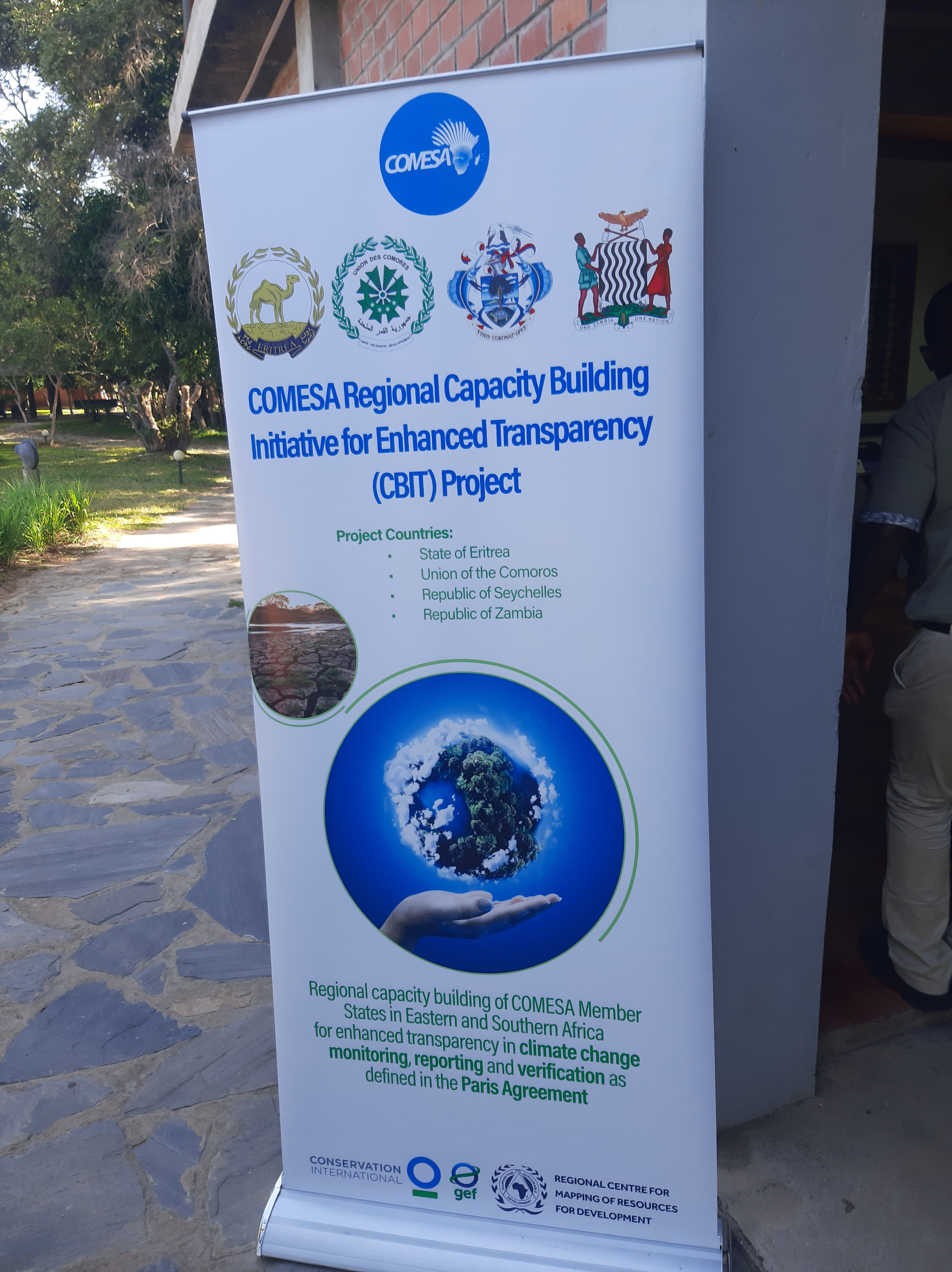
COMESA - Towards an Enhanced Transparency Framework
January 15, 2025
December 2024 was a critical month as Parties to the Paris Agreement were expected to submit their Biennial Transparency reports (BTR). The submission is to be followed by Parties' third Nationally Determined Contributions (NDCs) in February 2025. While countries are committed to meeting these deadlines, limited technical capacity has slowed their efforts.
Capacity building is key in ensuring countries can meet the deadlines. Through the regional project anchored on the Capacity Building Initiative for Transparency (CBIT), Conservational International, in collaboration with Common Markets for Eastern and Southern Africa (COMESA) and the Regional Centre for Mapping of Resources for Development, is currently undertaking capacity-building activities in Zambia, Seychelles, Comoros, and Eritrea. Several preconditions are necessary for successful capacity building.
- Capacity needs- understanding the capacity needs of countries is key to success. The project has undertaken a comprehensive assessment of current gaps and needs,
- Training materials – the training materials should be based on the capacity needs and gaps identified,
- Hands-on training – Successful capacity building is not just theoretical but involves hands-on training with participants able to show the concepts practically.
- Blend of virtual and physical training – CBIT Learning. The project has curated learning material to allow for wider access.
- Leverage existing expertise—Although some expertise exists in the countries, this needs to be increased by enrolling junior officers in capacity-building activities.
- Leverage on international and national expertise
Lessons learned from regional capacity-building activities
- Each country has specific needs and priorities.
- Needs and gaps keep emerging throughout the process, even with a needs assessment.
- There is a need to embed transparency units within relevant ministries.
- Countries desire to migrate from low to high tiers as they see an opportunity for funding because of better reporting standards.
- Developing institutional memory and continuous inventory improvement plan over time is key.
- Creating a pool of junior experts drawn from all the sectors involved in the compilation will enhance sustainability in the member states.
- In-depth skills in data gathering, processing, producing activity data, and conducting Quality Control and Assurance are a precondition for successful transparency.
Building capacity to achieve the Enhanced Transparency Framework is a continuous process, hence the need for more resources to support the course.
ABOUT
About Conservation International: Conservation International works to protect the critical benefits that nature provides to people. Through science, partnerships, and fieldwork, Conservation International is driving innovation and investments in nature-based solutions to the climate crisis, supporting protections for critical habitats, and fostering economic development that is grounded in the conservation of nature. Conservation International works in 30 countries around the world, empowering societies at all levels to create a cleaner, healthier, and more sustainable planet. Follow Conservation International's work on Conservation News, Facebook, Twitter, Instagram, and YouTube.
About the Global Environment Facility: The Global Environment Facility (GEF) underscores the importance of Enhanced Transparency Framework (ETF) as the backbone of the implementation of the Paris Agreement on Climate Change, as defined in its Article 13, and it is the internationally-agreed mechanism to track the progress of the Nationally Determined Contributions (NDCs).The Global Environment Facility supports developing countries in building their institutional and technical capacities to meet the requirements of the ETF through: i)The Capacity-building Initiative for Transparency (CBIT) ii) Support for reporting obligations under the Convention, i.e., National Communications (NCs) and Biennial Transparency Reports (BTRs); iii) Global support for the ETF.
The GEF is strongly committed to supporting the Paris Agreement's implementation and its ETF. Support for countries to build capacity and establish their monitoring and reporting systems is provided through the climate change focal area set-aside resources, which are additional to the country allocations under the GEF’s System for Transparency Allocation of Resources, or “STAR."
Common Markets for Eastern and Southern Africa (COMESA): Is a regional economic organization established in 1994, aimed at promoting regional integration through trade and investment. It’s 21 membership is drawn from mainly Eastern and Southern Africa. One of its key mandates is to build capacity of its member states through provision of technical assistance and capacity building programs to strengthen their institutions and human resource.
Regional Centre for Mapping of Resources for Development: Is an intergovernmental organization based in Nairobi, Kenya. Established in 1975, RCMRD provides services in remoting sensing and GIS (Geographical Information Services, surveying, Mapping and to its member states and other stakeholders. The primary mandate of RCMRD is to support sustainable development by offering technical expertise, capacity building, and data to enhance natural resource management and environmental monitoring services in Africa.
For more information on the CBIT project, visit; CBIT Data Clearing House and CBIT eLearning Platform
Written by: Bonventure Makhaya and Victor Esendi